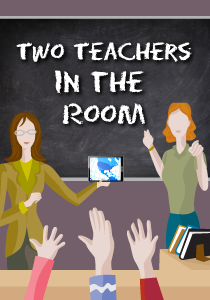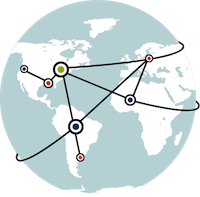Connected Co-Teachers Rule!
A MiddleWeb Blog
For more than a decade, I’ve been telling my students that when they come to my classroom, we will be learning in ways that will knock down the walls. I’ve been telling them that part of my job was to guide them to make connections and apply what we are learning to the world around them. And now, with technology and social media everywhere, the possibilities to do this are truly endless–and definitely awe-inspiring!
In honor of Connected Educator Month, I feel gratefully compelled to dedicate this post to the topic of what it means to be a connected educator and the value it holds for co-teachers.
In general, connected educators use online tools and social media to extend and elevate their professional practice. They join online learning communities, they connect with virtual colleagues on social networks, and they participate in educational experiences such as blogs, webinars, and online courses.

Connected Educators and Co-teaching
There are three truths about connected educators that I think co-teachers should embrace:
1. Teachers who use social media professionally crave genuine collaboration
The words cooperation and collaboration are often used synonymously. Yet don’t you just feel the subtle, yet distinct, difference? My virtual learning connections always result in the deep satisfaction of true collaboration.
For example, I participate in true collaboration with my virtual colleagues through the Center for Teaching Quality Collaboratory, as we share, learn, and push one another’s thinking along on a variety of pedagogical topics. When I communicate through my connections on Twitter (many of them sparked by this blog), I again experience that genuine sense of collaboration as we take a general interest in helping one another to achieve goals.
Cooperation on the other hand seems to have that unspoken sense of colleagues working together to achieve shared goals, but not necessarily in ways that deeply engage each other in a shared vision. Cooperation is what happens in most school settings (if we’re lucky) most of the time. And collaboration is what happens in some schools (if we’re luckier) when educators share an itch to move beyond the status quo. Co-teachers should strive for this connected educators’ feeling of true collaboration.
2. Teachers who use social media are life-long learners
A life-long learner is a person who has that spirited commitment to learning that is driven by the constant process of questioning, seeking, and sharing. It is a person who seeks new understandings by pushing beyond his own perspective and experiences. And social media allow for us to learn from one another on a national and global level. Life-long learners seek new information beyond our immediate surroundings and familiar cultures.
Co-teachers must exercise this questing urge and desire for professional growth as they learn from one another in connected venues. They must model the learning process by stepping out of their comfort zones and trying new teaching techniques. When we do this, we are modeling the process of true learning for our students and our colleagues — a process that includes making mistakes, reflecting, and striving toward academic and personal goals.

Teachers who use social media want to broaden their perspective. They learn to hear and to value their own voice (no small accomplishment), but they also open themselves to learning from the perspectives of others. They know that by collaborating with virtual colleagues from around the world, they will strengthen their own credibility and bring valuable new knowledge into the work they do with colleagues and students in their schools and classrooms.
Connecting with other dedicated educators from around the world creates an endless process of solution seeking, mind-stretching, and the reciprocal exchanging of ideas that create an amazing cycle of positive outcomes for all involved.
Connected Co-Teachers
The strengths that we gain from being connected professional learners can produce a firm foundation for building positive relationships among special and general educators in co-teaching roles. Here are some ideas to spark your connected co-educator journey.
- Connect through Twitter: This virtual learning forum allows for professional connections anytime, anywhere. It is an opportunity for you to validate your own thinking as you extend your awareness and knowledge about what’s happening in other schools and classrooms all over the world. It is truly empowering! Time is never a factor because you choose when to connect.
There are also many scheduled chats to choose from that allow you to communicate with dedicated educators in real-time. For example, every second and fourth Tuesday from 8:00-8:45 ET I’m involved with a chat about “everything co-teaching.” So join us! All you need to do is get on Twitter, follow the hashtag #coteachat (and include it in your responses) to meet members of your own tribe and share your voice.
- Go beyond cooperation and Collaborate! Apply the values associated with being a connected educator to your work with teachers in your own building and classrooms. Discuss your goals, share your visions, and plan a process of learning that can work wonders for you, your co-teachers and your students. Make time to reflect on how you use your instructional time, so that you may plan your co-teaching partnership accordingly in the best interest of your students. Collaborate to the greatest degree possible. Seek to share and to learn from one another. Connect to the world together.
- Keep your students’ goals in mind. As you work to connect to your co-teachers with greater consistency and results, keep in mind that student achievement is the ultimate goal. Let the needs of the students in your class drive your teaching behaviors.
As we use technology and social media to knock down the walls and allow the world into our classrooms, co-teachers also need to knock down any walls that separate us. That’s the only way we will create increased learning for everyone in inclusion classrooms.
How do you exercise the connected educator in you? What’s your plan of action as you work to knock down walls…?


































Consider being “connected” with your school librarian.
Jean, thanks for your comment. It’s so true–the librarian in my building is definitely a resource maven! She shares her knowledge of books, articles, videos, websites, etc. She makes such a meaningful (and invaluable) contribution to the culture of collaboration that we all strive for…
Thanks for adding your perspective!
Another great post! It’s amazing how connected you feel when you use social media to extend your own learning. Twitter has really opened up many new doors for me as a professional and has pushed me to extend my own learning. My favorite comment in this post is “…spirited commitment to learning…”